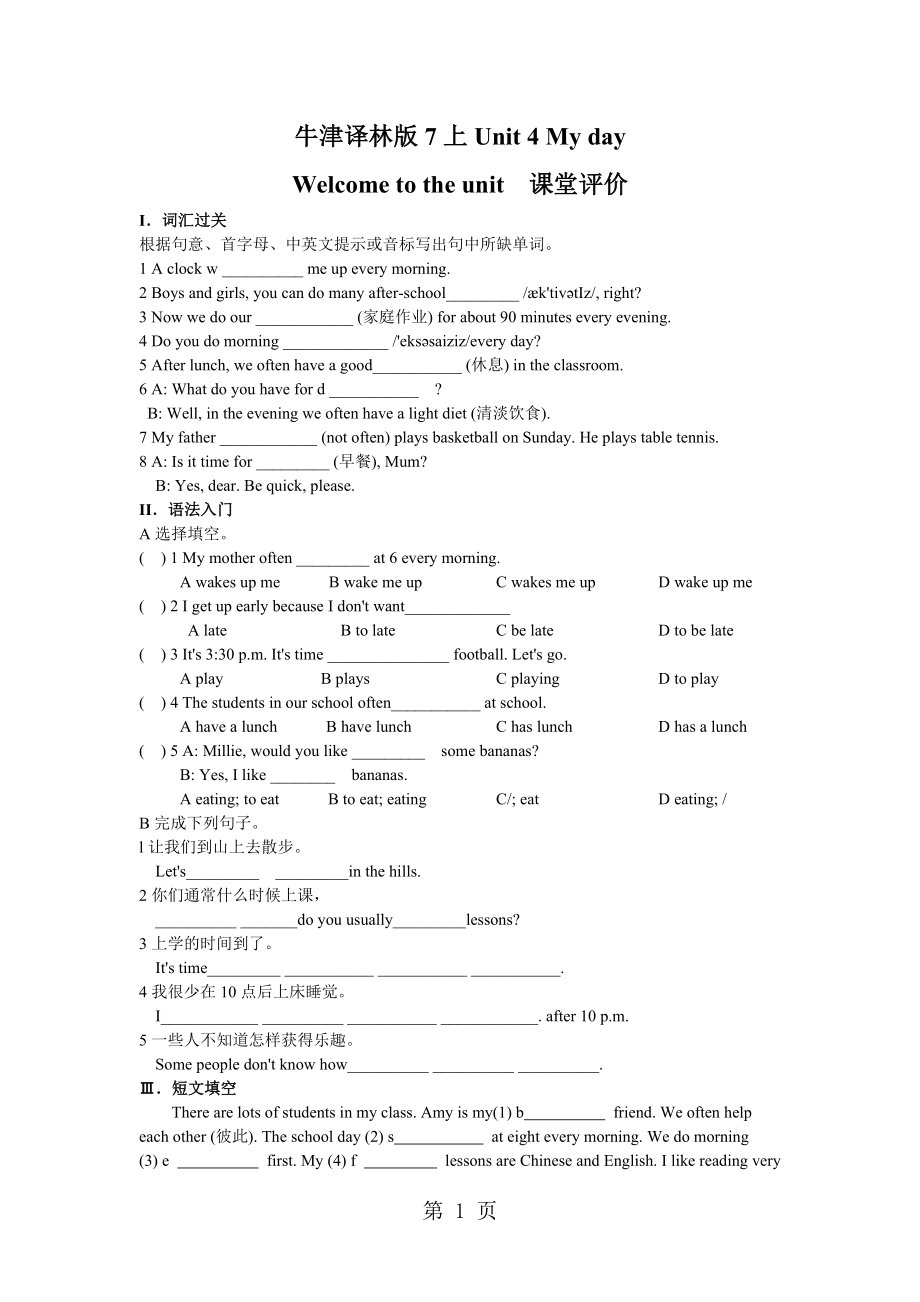《牛津譯林版7上Unit 4 My day Welcome to the unit課堂評價含答案word文檔》由會員分享��,可在線閱讀,更多相關(guān)《牛津譯林版7上Unit 4 My day Welcome to the unit課堂評價含答案word文檔(2頁珍藏版)》請在裝配圖網(wǎng)上搜索�。
1、牛津譯林版7上Unit 4 My day
一般說來�����,“教師”概念之形成經(jīng)歷了十分漫長的歷史�。楊士勛(唐初學者,四門博士)《春秋谷梁傳疏》曰:“師者教人以不及�,故謂師為師資也”。這兒的“師資”���,其實就是先秦而后歷代對教師的別稱之一���。《韓非子》也有云:“今有不才之子……師長教之弗為變”其“師長”當然也指教師���。這兒的“師資”和“師長”可稱為“教師”概念的雛形�����,但仍說不上是名副其實的“教師”���,因為“教師”必須要有明確的傳授知識的對象和本身明確的職責�����。 Welcome to the unit 課堂評價
教師范讀的是閱讀教學中不可缺少的部分����,我常采用范讀�����,讓幼兒學習����、模仿。如領(lǐng)讀�����,我讀一句�,讓幼兒讀
2����、一句,邊讀邊記;第二通讀��,我大聲讀���,我大聲讀���,幼兒小聲讀,邊學邊仿���;第三賞讀����,我借用錄好配朗讀磁帶�,一邊放錄音,一邊幼兒反復(fù)傾聽����,在反復(fù)傾聽中體驗、品味�����。 I.詞匯過關(guān)
“教書先生”恐怕是市井百姓最為熟悉的一種稱呼�,從最初的門館�����、私塾到晚清的學堂��,“教書先生”那一行當怎么說也算是讓國人景仰甚或敬畏的一種社會職業(yè)�����。只是更早的“先生”概念并非源于教書�,最初出現(xiàn)的“先生”一詞也并非有傳授知識那般的含義��?��!睹献印分械摹跋壬螢槌龃搜砸?����?”���;《論語》中的“有酒食,先生饌”����;《國策》中的“先生坐,何至于此�?”等等,均指“先生”為父兄或有學問����、有德行的長輩。其實《國策》中本身就有“先生長者����,有德之稱”的說
3、法�。可見“先生”之原意非真正的“教師”之意����,倒是與當今“先生”的稱呼更接近?�?磥?�,“先生”之本源含義在于禮貌和尊稱����,并非具學問者的專稱。稱“老師”為“先生”的記載���,首見于《禮記?曲禮》��,有“從于先生�,不越禮而與人言”,其中之“先生”意為“年長�����、資深之傳授知識者”����,與教師、老師之意基本一致�。根據(jù)句意、首字母���、中英文提示或音標寫出句中所缺單詞�����。
1 A clock w __________ me up every morning.
2 Boys and girls, you can do many after-school_________ /?k'tiv?tIz/, right?
3 No
4���、w we do our ____________ (家庭作業(yè)) for about 90 minutes every evening.
4 Do you do morning _____________ /'eks?saiziz/every day?
5 After lunch, we often have a good___________ (休息) in the classroom.
6 A: What do you have for d ___________ ?
B: Well, in the evening we often have a light diet (清淡飲食
5、).
7 My father ____________ (not often) plays basketball on Sunday. He plays table tennis.
8 A: Is it time for _________ (早餐), Mum?
B: Yes, dear. Be quick, please.
II.語法入門
A選擇填空�。
( ) 1 My mother often _________ at 6 every morning.
A wakes up me B wake me up C wakes me up
6���、 D wake up me
( ) 2 I get up early because I don't want_____________
A late B to late C be late D to be late
( ) 3 It's 3:30 p.m. It's time _______________ football. Let's go.
A play B plays C playing D to pl
7�、ay
( ) 4 The students in our school often___________ at school.
A have a lunch B have lunch C has lunch D has a lunch
( ) 5 A: Millie, would you like _________ some bananas?
B: Yes, I like ________ bananas.
A eating; to eat B to eat; eating C
8、/; eat D eating; /
B完成下列句子�����。
l讓我們到山上去散步���。
Let's_________ _________in the hills.
2你們通常什么時候上課�,
__________ _______do you usually_________lessons?
3上學的時間到了����。
It's time_________ ___________ ___________ ___________.
4我很少在10點后上床睡覺。
I____________ __________ ___________ ____________. after
9����、 10 p.m.
5一些人不知道怎樣獲得樂趣。
Some people don't know how__________ __________ __________.
Ⅲ.短文填空
There are lots of students in my class. Amy is my(1) b friend. We often help
each other (彼此). The school day (2) s at eight every morning. We do morning
(3) e first. M
10����、y (4) f lessons are Chinese and English. I like reading very
much, and I go to the (5)1 every day. There's a (6)p in our school. I
often play volleyball with my classmates there. Amy is a (7) m of the Swimming
Club. She swims very (8) w__________.
Ⅳ.閱讀驛站
11、 Sue and Linda usually go to school by car. They drive (開車) past a cinema, a supermarket
and a toy shop. The toy shop is next to (在 ......隔壁) the supermarket. Jack and Michael usually go to school by bus. They go past a bank and a post office. The bank is next to the post office. Mary usually g
12����、oes to work by bike. She rides (騎車past a police station (局), a library and a swimming pool.
( ) 1 How many people are there in this passage?
A Two. B Three. C Four. D Five.
( ) 2 Which is the bank?
A A. B B. C C.
13����、 D D.
( ) 3 How does Linda go to school?
A By bike. B By bus. C By car. D On foot.
( ) 4 Which is the library?
A A. B B. C C. D D.
( ) 5 The __________is next to the cinema.
A restaurant
14�、 B supermarket C toy shop D post office
答案:
I. A 1 wakes 2 activities 3 homework 4 exercises
5 rest 6 dinner 7 seldom 8 breakfast
II. A 1-5 CDDBB
B 1 go walking 2 What time, have 3 to go to school
4 seldom go to bed 5 to have fun
III. 1 best 2 starts 3 exercises 4 favourite 5 library
6 playground 7 member 8 well
IV. 1-5 DBCDB
第 2 頁
 牛津譯林版7上Unit 4 My day Welcome to the unit課堂評價含答案word文檔
牛津譯林版7上Unit 4 My day Welcome to the unit課堂評價含答案word文檔

